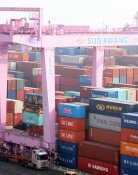The political insult continues
The political insult continues
Posted April. 14, 2020 08:26,
Updated April. 14, 2020 08:26
The supreme council of the United Future Party has decided on Monday to expel Cha Myeong-jin who stirred controversy with his remarks on “Sewol tent.” The ethics board suggested “leaving the party” to Cha before the expulsion, but it resulted in encouraging him even further to spout insults. Jeong Bong-ju, a senior member of the Open Minjoo Party, which considers itself a proportional party for the pan-progressive parties, used abusive words criticizing the leadership of the ruling Democratic Party of Korea.
With the April 15 general elections around the corner, the chronic part of the politics is manifesting itself. The election campaigns for the upcoming elections have been unusually quiet and calm due to social distancing, a measure introduced to respond to COVID-19. With everyone trying to be kind and considerate one another, the expectations were that the politics would mature, too. However, the election campaigns have been once again filled with disgraceful verbal attacks.
The use of foul language is not just a problem of one candidate. Regardless of political leanings, everyone candidate on the campaign trail to party leaders, are guilty of it. They call others “trash,” “thug” and “traitor” and make groundless accusations saying that the government might do a terrorist act. Even though they understand all these will eventually backfire on them, they do not seem to mind thinking that it cannot do more harm as they are already involved in verbal fights.
Considering that even party leaders are also engaged in this war of words, it is difficult to expect political parties to come clean and pick up the pieces. The ruling party has remained silent even after it was revealed that one of its candidates agreed with those who promoted sexual exploitation and judged women’s appearance on a Podcast. It does not seem to care as long as it can get the elections done, which is extremely irresponsible. The United Future Party should have taken a stronger stance in the first place to stop its candidate from making abusive remarks. It belatedly decided to expel Cha just because they were worried it might have a negative impact on the elections.
Words are an integral part of the politics, and candidates might get carried away in the run up to elections. However, words used by members of the National Assembly, incumbent or future, should carry a sense of dignity as they represent the public. Foul words and suspicions spread quickly like a virus. When these words are openly used, it affects the language the public uses and takes a toll on their mental health. Those who make verbal attacks should not be allowed in the politics. This is the verdict voters should give at the polling station tomorrow.







